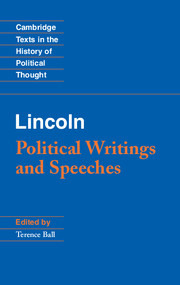Book contents
- Frontmatter
- Contents
- Preface
- Introduction
- Chronology
- Biographical synopses
- A note on sources and abbreviations
- Bibliographical note
- I Political Writings and Speeches
- II Notes and Fragments
- 36 On Government (1854?)
- 37 On Slavery (1854?)
- 38 On Slavery and Democracy (1858?)
- 39 On Pro-slavery Theology (1858)
- 40 On the Struggle against Slavery (c. July 1858)
- 41 On Racial (In)equality 1
- 42 On Racial (In)equality 2
- 43 The Declaration of Independence includes all men
- 44 On Slavery, Property, and the Constitution
- 45 On Labor and Capital 1 (c. 1846–7)
- 46 On Labor and Capital 2
- 47 On Labor and Capital 3
- 48 On Liberty
- 49 On the Thirteenth Amendment (abolition of slavery)
- Index
49 - On the Thirteenth Amendment (abolition of slavery)
Fourth Annual Message to Congress (December 6, 1864)
Published online by Cambridge University Press: 05 April 2013
- Frontmatter
- Contents
- Preface
- Introduction
- Chronology
- Biographical synopses
- A note on sources and abbreviations
- Bibliographical note
- I Political Writings and Speeches
- II Notes and Fragments
- 36 On Government (1854?)
- 37 On Slavery (1854?)
- 38 On Slavery and Democracy (1858?)
- 39 On Pro-slavery Theology (1858)
- 40 On the Struggle against Slavery (c. July 1858)
- 41 On Racial (In)equality 1
- 42 On Racial (In)equality 2
- 43 The Declaration of Independence includes all men
- 44 On Slavery, Property, and the Constitution
- 45 On Labor and Capital 1 (c. 1846–7)
- 46 On Labor and Capital 2
- 47 On Labor and Capital 3
- 48 On Liberty
- 49 On the Thirteenth Amendment (abolition of slavery)
- Index
Summary
. . . At the last session of Congress a proposed amendment of the Constitution abolishing slavery throughout the United States, passed the Senate, but failed for lack of the requisite two-thirds vote in the House of Representatives. Although the present is the same Congress, and nearly the same members, and without questioning the wisdom or patriotism of those who stood in opposition, I venture to recommend the reconsideration and passage of the measure at the present session. Of course the abstract question is not changed; but an intervening election shows, almost certainly, that the next Congress will pass the measure if this does not. Hence there is only a question of time as to when the proposed amendment will go to the States for their action. And as it is to so go, at all events, may we not agree that the sooner the better? It is not claimed that the election has imposed a duty on members to change their views or their votes, any further than, as an additional element to be considered, their judgment may be affected by it. It is the voice of the people now, for the first time, heard upon the question. In a great national crisis, like ours, unanimity of action among those seeking a common end is very desirable – almost indispensable. And yet no approach to such unanimity is attainable, unless some deference shall be paid to the will of the majority, simply because it is the will of the majority. In this case the common end is the maintenance of the Union; and, among the means to secure that end, such will, through the election, is most clearly declared in favor of such constitutional amendment.
- Type
- Chapter
- Information
- LincolnPolitical Writings and Speeches, pp. 241Publisher: Cambridge University PressPrint publication year: 2012

